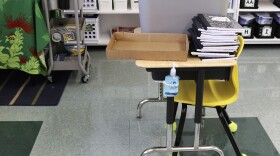University of Hawaiʻi President David Lassner spoke to The Conversation on Wednesday at length about a number of subjects. It was a chance to reflect on how well the university system weathered the challenges of our health and economic crises, but also to address the turmoil of what to do about a new football stadium.
When the university learned Aloha Stadium was closing indefinitely in December 2020, the UH Board of Regents approved the expansion of T.C. Ching Field on the Mānoa campus to accommodate the Division I football team. Lassner said he hopes the team does not play there long term.
The Ching Field buildout to accommodate 15,000 seats is still on track, but Lassner is open to what could happen with a new Aloha Stadium in Halawa.
"We've been hoping, you know, that a plan would come together to rebuild a great new stadium by the state. That has not yet happened. I know Gov. Green is committed to it, but we haven't seen the detailed plan yet," Lassner told The Conversation. "The concerns have been raised about a number of issues and the financial viability of the plan that is put before him."
While the Legislature appropriated funds to design and build a new stadium, it's unclear who would pay to manage and maintain it.
"We're really less interested in who builds it and how it gets built. We want a great place to play football for our fans and our players that can support a Division I program," Lassner said. "And we want a financial deal so that we can afford to play there."
Off the field, the UH Mānoa esports program recently received national recognition from the Esports Awards as the top collegiate program of the year.
"I was really pleased to see us hosting the international tournaments. And we leveraged Hawaiʻi's position in the middle of the Pacific for low latency fiber optic connections to equalize opportunity between Asia and North American participants here when people couldn't travel because of COVID," Lassner said. "So far esports is well over a billion dollars a year as an industry globally, and it's only growing. And we're creating great opportunities, I think, for our students."
Lassner also touched on the university's strategic plan, which is poised to address Hawaiʻi's workforce shortage in health care and education — and other weaknesses in the economy.
"Health care workforce is the first one we're really digging into. But we're equally committed to understand how we can address, you know, the long-standing teacher shortage," Lassner said. "We're also working really hard with employers, that what we've realized is we can't just sit back on our campuses and do this ourselves. We need to engage in deep and meaningful ways with employers."
This interview aired on The Conversation on Jan. 4, 2023. The Conversation airs weekdays at 11 a.m. on HPR-1.







